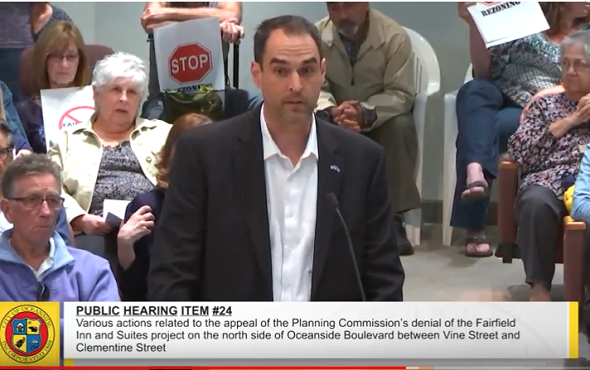|
At the May 9th Oceanside City Council meeting, Chamber CEO, Scott Ashton, addressed councilmembers on issues of importance to the local business community. The first issue was regarding the SOAR initiative which recently gathered the signatures needed to appear on the November ballot.
The chamber has opposed this initiative from early on due to its implementation of "ballot-box zoning" and its attack on private property rights. The council had the option of adopting SOAR as ordinance, placing it on the November ballot, or ordering a 30 day impact study before formally placing the initiative on the ballot. Ashton requested the option of the 30 day study. In addressing the council, he said "With the unknown financial impacts to the City of Oceanside, we request that City staff, with the help of outside consultants, prepare a 30 day study on the economic impacts of SOAR so our community will have true insight as to what they are voting on." At its May 9th meeting, the Oceanside City Council voted in favor of the Fairfield Inn Hotel project, slated for Oceanside Blvd, just west of I-5. The project had originally been denied by the planning commission, but was supported in a 3-2 vote of the council, with Mayor Peter Weiss and councilmembers Jerry Kern and Jack Feller voting in favor of the project.
The 99-room hotel project, which is supported by the Chamber, would provide an estimated $500,000 annually of additional TOT revenue to the City, along with the potential of increased sales tax revenue. On May 2nd, the Oceanside Chamber of Commerce Business and Community Political Action Committee (BACPAC) hosted a candidate forum for the 76th Assembly District, the seat currently held by Assemblymember Rocky Chavez.
The event was co-hosted by the MiraCosta College Associated Student Government (ASG), Vista Chamber of Commerce, Carlsbad Chamber, Encinitas Chamber and the Fallbrook Chamber and was sponsored by Genentech. Six of the eight candidates were in attendance to answer a dozen questions posed from the business community, audience members and ASG members. The event video was produced by MiraCosta College and includes the complete forum. If you have a website then you may have heard that Google is planning some BIG changes in the coming months that will impact every website owner. These changes are part of Google's efforts to get website owners to implement recommendations to make the internet more secure, faster and easier to use.
While Google is constantly updating their search ranking factors, these upcoming changes will have a much greater affect and require pro-active attention in order to avoid some fairly drastic outcomes. What are these BIG Google changes? - Google HTTPS Security Deadline * Google Mobile-First Index * Google Maps Platform * GDPR (General Data Protection Regulation) Below is an overview of each of the coming changes, plus suggestions for what you should do about it. Google deadline for HTTPS Security - Is your site ready? Starting in July, Google plans to mark all HTTP sites as non-secure! That's because Google wants all websites to use the HTTPS protocol instead of HTTP. That ‘S’ on the end stands for secure. The HTTPS protocol helps protect your website from hackers trying to cause harm or divert traffic, plus it helps protect visitors to your website. Google is actively working to get websites to adopt the HTTPS protocol. Websites that do not comply will be penalized with a BIG WARNING when people attempt to visit any non-HTTPS websites. Can you imagine having your website flagged by Google with a big "NOT SECURE" warning? Here is more info directly from Google: https://security.googleblog.com/2018/02/a-secure-web-is-here-to-stay.html What should you do? The good news is that it requires minimal time and cost to implement the HTTPS change. Plus there are other benefits, from boosting Search Engine Rankings to making visitors feel safer on your website and more importantly when providing their information. The easiest fix is to call your website hosting company, purchase an SSL certificate and ask them to install it. (Cost will vary depending on your host, but typical cost is $99 a year.) The clock is ticking... July 2018 is the deadline for when prominent warnings will begin to show to Chrome users. Don't delay! PRO TIP: After upgrading to HTTPS remember to TEST every page on your site to ensure the upgrade did not affect the layout or content. Also, set-up a redirect from the HTTP version and update every online profile and primary links with the new URL. It's also a great time to refresh and update profiles, add photos, test new ads and keywords, etc. If you would like assistance to ensure a smooth HTTPS upgrade process, we can help you develop an upgrade plan or handle the entire process for you. Contact us Mobile Responsive - Is your site ready for Google's Mobile-First index? Google has been moving towards mobile-first indexing for over a year. Not surprising, since mobile now outpaces desktop for web searches. Any website that does not perform as well on a mobile device as it does on desktop is already at a huge disadvantage. But Google's official announcement that mobile-first indexing is underway makes it of vital importance that your website is mobile-first focused. What is mobile-first indexing? Previously, when Google crawled the pages of your website to determine your ranking, it did so from a desktop perspective. Mobile-first indexing simply means Google will now crawl using a mobile perspective. If your website is mobile-friendly and has mobile-optimized content (images, links, forms, etc) then you are set. Just make sure that what you think is "mobile friendly" is the same as Google! What should you do? Even if Google had not started the shift towards mobile-first indexing, any site that is not mobile optimized has a huge disadvantage against the competition. The most important thing is not to delay. Today's websites need to be mobile optimized for many reasons, but Google's mobile-first indexing is among the highest priority. You can learn more about the Google mobile first rollout here: https://searchengineland.com/google-begins-rolling-out-mobile-first-indexing-to-more-sites-295095 PRO TIP: If you are not sure your website is mobile-friendly, the first step is to test your site using Google's free mobile-friendly testing tool: https://search.google.com/test/mobile-friendly. Make sure to check the VIEW DETAILS link on the test results page or you could miss important details. If you do need to update your website for mobile, consider a design refresh at the same time. Also make sure to update any themes, plugins or scripts used on your website as these cause security risks if outdated. Lastly, make sure to TEST your site on multiple mobile browsers for speed, look and user experience. If you need help with your mobile first strategy to ensure maximum results, we can help you develop a mobile plan or handle the entire process for you. Contact us Google Maps Platform - Does your site use Google Maps? Beginning June 11th, Google is changing their Google Maps platform and launching a new pricing plan. You’ll need to enable billing with a credit card and have a valid API key for all projects using any of these three products: Maps, Routes, and Places. This applies to your website if you are using Google Maps or any type of Google phone app. Since most businesses with a public location use Google Maps, this likely applies to most websites. What should you do? While this change is not nearly as important as the HTTPS and Mobile changes, it still affects any website owner that uses any of the Google Maps Platform products or services. Here is a guide for more info and to check if your website is affected: https://cloud.google.com/maps-platform/user-guide/ Since Google is offering a $200 monthly credit for any Maps account, it is unlikely that most websites will ever incur a cost. In fact Google estimates only 2% of accounts will exceed their monthly credit limit. While you do not have to create an account, it will limit your usage of Google Maps products if you do not. PRO TIP: By creating an account for the Google Maps Platform you are issued a valid API Key. API keys are the preferred authentication method for accessing Google Maps Platform APIs. Having a valid API key not only provides more customization options for your map, but it serves as a Google security credential for your map location. In this era of such concern over security being authenticated by Google has many value-added benefits. If you need help with your Google Maps Platform, we can help assess your needs and recommend an action plan or manage the entire process for you. Contact us |
Categories
All
Archives
December 2023
|
|
|
|
|




 RSS Feed
RSS Feed
